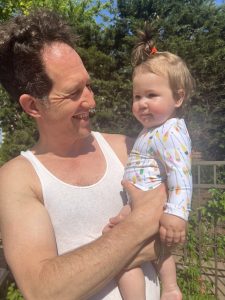Traditional Chinese Medicine
Father’s Day, from a Chinese Medical Perspective

In celebration of my first Father’s Day as a father I couldn’t help but reflect on when and why I first decided that I wanted to have children. As an exorbitantly self-absorbed, 20-year-old, male urbanite with artistic passions and lofty career goals, I never thought about having kids. I don’t know that I defiantly didn’t want a baby—nor did I consciously want one. It wasn’t until approximately a decade later, upon my initial explorations into Buddhism and spiritual literature that I decided procreation mattered to me.
Parenthood, in my opinion, represented an important experience towards self-actualization. Like most young adults I developed aspirations to give to my future child an even richer and more complete experience than was given to me, which I’m confident my own parents succeeded in providing relative to their upbringings. I think most of my generation were brought up with greater affection and career opportunities than the previous generation. My hope is to bring my daughter up with a greater cultural experience and spiritual awareness, and of course a more conscious diet.
I entered parenthood with these naïve notions, images of sitting lotus posture across from my child, our eyes locked as I imparted fortune cookie wisdoms to her, until we spontaneously merge into an exploding ball of white light and love. Instead, my experience is closer to that of an unpaid employee at a 2-star restaurant, who frantically wears the hats of chef, dishwasher, busboy, and maintenance man, while shouting back and forth at my “co-worker” anything but pieces of fortune cookie wisdoms. I am aware of course, as I sit here typing this, that these are the “spiritual experiences” in action that I sought. Though it is admittedly beyond challenging in those moments to recognize them as such, or to understand what it means to be a father.
With all due respect to the modern mutability of gender roles, identifications, and definitions, when I think of a father I think of my own dad, the masculine energy, or “yang qi” of the body. In Chinese Medicine our first line of immunological defense are the “tai yang” (or “greater yang”) channels. It is the job of the yang qi to protect and warm us, also to motivate and excite us, and direct us upwards… which may be why my daughter prefers that I lift her up towards the ceiling to kick her legs and laugh, but insists with no equivocation that she always be put down to sleep by the calmer, more nourishing, “yin energy” of Mom.
While my own father was a paternal treasure, an awesome dad five times over, where I saw his “yang qi” finally falter in his later years was in the all too common indulgences of “pathological yin” substances: Sugar, alcohol, cold foods and drinks, a sedentary and relatively anti-social lifestyle over time will put out our yang fire, and too often in our society what we see in older dads are soft, curvy, and fleshier physiques concurrent with quiet, more withdrawn demeanors. While some degree of grounded calm is very organic in our later years, my opinion and observation is that there can be a healthier, more engaged manifestation of it.
Without much apparent choice in the matter, my intention is to continue grinding away in the 2-star restaurant, hopefully with perpetually greater mindfulness that every sleepless night, every screaming cry, and scrubbing session on my hands and knees of the cooked produce peppered around our living room floor is the spiritual experience. With hopes that one day through my own appropriate discipline and self-care, I’ll possess adequate yang qi by which to sit lotus across from Peyton, look into her eyes, and impart everything I know, and don’t know.
Happy Father’s Day!
Benefits of Acupuncture during Pregnancy

Bringing a child into the world is one of life’s greatest gifts. But, along with the anticipation of that little bundle of joy, often comes some physical challenges and discomfort that can make for a long nine months. Did you know that acupuncture has been shown to address several issues that come up during pregnancy? Here’s what to know about the benefits of acupuncture during pregnancy and what the research actually says is true. continue reading
The Benefits of Acupuncture for Chronic Fatigue

The Mayo Clinic describes Chronic Fatigue Syndrome (CFS) as a “complicated disorder characterized by extreme fatigue that lasts for at least six months and that can’t be fully explained by an underlying medical condition. The fatigue worsens with physical or mental activity, but doesn’t improve with rest.” It’s estimated that there are more than 200,000 cases of CFS in the U.S. and research has proven that acupuncture, combined with other treatments can help to alleviate the symptoms that come with CFS. continue reading
Benefits of Acupuncture in a Palliative Care Setting

People entering a hospice or palliative care setting bring with them a host of symptoms and emotions and often a multidisciplinary team of doctors and care providers. Research has shown that the addition of an acupuncturist to the hospice team can be effective and impactful at providing maximum comfort and improve quality of life. continue reading
Three Things to Know About Acupuncture & Herbal Medicine

Acupuncture and herbal medicine often go hand-in-hand. Herbal medicine is often used in conjunction with acupuncture, as appropriate, to support the body’s healing process. Just like a traditional medical prescription, herbs are prescribed by Oriental Medicine practitioners to address a variety of health concerns. They are often prescribed as formulas rather than specific individual herbs and are tailored to the needs of the patient. And just like traditional prescription medicine, herbs are adjusted as the patient’s needs change. Some Western hospitals are now utilizing Chinese herbs in their treatment protocols. For example, the Cleveland Clinic has a licensed and certified Chinese herbalist on staff. continue reading


